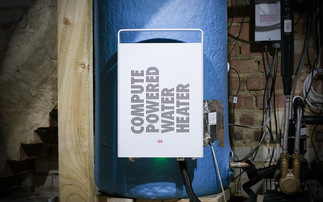Sustainable Energy Association leads call for election campaign with a degree of consensus on the importance of energy efficiency and onsite renewables
Every general election is seen as the most important in modern history, but for the UK's green home, energy efficiency, and onsite generation sectors there are plenty of reasons to believe May 2015 will prove crucial to their future development.
Siemens decision to invest £310m in a new offshore wind turbine factory in Hull may have today delivered a timely confidence boost to the large scale renewables industry, but the smaller scale "demand-side" improvements promised by the closely related energy efficiency and onsite renewables industries are facing a much more uncertain future. Investor confidence was dealt a major blow last year with the watering down of the Energy Company Obligation (ECO) energy efficiency schemes, while concerns remain about the health of the Green Deal energy efficiency financing scheme. And although the feed-in tariff and renewable heat incentive (RHI) schemes have helped mobilise investment, both have been marred by delays and disruption.
Moreover, while Ed Miliband's controversial price freeze and David Cameron's decision to respond by cutting the ECO scheme indicates energy policy is likely to remain near the top of the political agenda all the way through to next year's election, fears are mounting that May 2015 could see the clean energy sector used as a political football.
That is why the newly rebranded Sustainable Energy Association (SEA) (formerly the Micropower Council) yesterday hosted an event to discuss what the industry can expect from next year's election, what green businesses operating on the "demand side" of the energy market would like to see from the next government, and how they might go about securing the supportive policy environment the sector still needs.
As Dave Sowden, chief executive of the SEA, observed, the industry is facing a period of potentially damaging uncertainty, with a number of key policies like to face significant reforms within the next two years. "Once we get beyond next May all sorts of uncertainty could be on the horizon," he told the audience of green business executives. "We have recently been through a period of uncertainty even during the midterm of the parliament, when we saw major changes to the ECO policy announced. It is really important, if we are not to destabilise both market confidence and investor confidence in what is a crucial period up to 2020 that we keep the political parties' toes to the fire to ensure that they don't seek such a level of political differentiation in the policies being put forward that no one can get deals signed, nobody can actually start or sell companies, and nobody can float companies or raise investment. It is absolutely crucial that our politicians maintain investor and market confidence."
However, there are mounting concerns that this confidence could be undermined as each of the three main parties seek differing approaches to the inter-related challenges of energy decarbonisation, security, and affordability. Approaches that could have a near immediate impact on the energy efficiency and onsite generation sector, Sowden warned, as any incoming government will undertake a comprehensive spending review that would come into effect from early 2016. The net result is that the RHI, feed-in tariff, Green Deal, ECO, green building standards and other supporting policies could all face further disruption early in the next parliament, despite the widespread acceptance that energy efficiency measures represent the most cost effective means of cutting carbon and tackling fuel poverty.
As such, business leaders from across the industry yesterday called for a series of specific policies and more general political commitments from the three main parties, which they argued could protect the sector from further job losses and help ensure that investment continues to flow even at a time of inevitable political uncertainty.
Specifically, John Sinfield, managing director for Northern Europe at Knauf Insulation, called for more "clarity of ownership for energy policy and energy efficiency" in order to end the turf war between the Department of Energy and Climate Change (DECC), the Treasury, the Cabinet Office, and the Department of Communities and Local Government (DCLG). It was a call echoed by Sinfield's peers, all of whom raised concerns with Communities Secretary Eric Pickles' attempts to water down green policies, most notably through his decision to axe the proposed consequential improvement rules that would have required households building extensions to also improve their efficiency.
"We need an acknowledgement that not all regulation is bad regulation," said Tim Pollard, head of sustainability at building products distributor Wolseley UK. "It seems to me extraordinarily obtuse when you can have a vast amount of agreement across an entire industry and the government then takes an alternative approach. Building regulations have been key to achieving energy efficiency."
Sowden warned further threats to the industry were in the pipeline at DCLG. "The recent watering down of the proposed Building Regulation changes and the proposed repeal of the Planning and Energy Act are particularly damaging," he said. "Mr Pickles' obsession with the deregulation mantra is costing jobs, damaging UK competitiveness and adding cost to fuel bills."
Similarly, Andrew Keating, marketing director for UK and Ireland at boiler manufacturer Baxi, argued that whoever forms the next government will have to move quickly to deliver more policy certainty and ambition on a number of fronts or risk an investment hiatus. He said the future of the RHI beyond 2016 needed to be confirmed as a matter of urgency to ensure supply chain investment continues to flow and argued that the government also needed to do more to support combined heat and power technologies, which promise to cut emissions and enhance efficiency for larger properties.
In addition, he argued politicians need to deliver a new approach for dealing with what Baxi refers to internally as "hard to treat heat". "ONS estimates in its annual housing survey showed there are five million homes with boilers that are 70 per cent efficient or less and come 2030 there will still be about a million of those appliances," he said. "We think there is further action to be taken. How do we incentivise or regulate consumers to make it worth their while to replace those ageing products, rather than just repair them?"
However, it is in the general approach of the political community to energy efficiency and demand-side measures that the industry wants to see the biggest transformation. "I want to see what appears to be impossible," said Sinfield. "A political climate - a government of whatever colour - that considers investment in our energy security and the sorting out of the worst housing in Europe as being a real long term proposition... We don't consider the use of insulation to be a national infrastructure priority, but it should be. We consider the building of nuclear power stations to be a national infrastructure priority and we are quite happy to offshore billions of pounds to a company owned by the French government to build a nuclear power station. But if we invested a fraction of that money in sorting out the energy efficiency of our existing building stock, the vast majority of which we will have in 2050 then perhaps we would not need to spend as much money on building new power stations."
The industry's hope is that establishing energy efficiency as a national infrastructure priority would also deliver a stronger political consensus that would make the Prime Minister's controversial decision to slash support for energy efficiency impossible in the future. "We need a real recognition from whatever government is in power next time that tackling fuel poverty and energy security are real issues today and we have to put them are the forefront of policy," said Andrew Hillier of renewable heat specialist SIG/Ice Energy. "Major energy infrastructure projects have to be cross party and long term. The national grid, the water boards, they were not single government or single policy measures. They were long term objectives of the state. Energy efficiency and renewable energy and moving to a decarbonised grid should be looked upon in the same way. I know that is difficult when everyone wants to score points... but we have to have a considered long term approach."
The challenge for the industry is how to build and nurture such a consensus when political forces currently appear to be pulling in the opposite direction. As Sowden admitted big energy infrastructure projects have an appeal to politicians that distributed energy projects lack, in that the policy levers they pull to deliver a big project, like Siemens new offshore wind turbine plant, deliver clear and tangible results. In contrast, the carbon and cost savings delivered by demand side policies may be greater, but it is often harder for politicians to claim credit for changes taking place in millions of homes.
The answer for the SEA and its members appears to be to focus on increasingly compelling evidence that shows that energy efficiency and onsite generation measures are the most cost effective means of tackling fuel poverty and cutting energy bills. Senior industry figures were united in bemoaning the paucity of industry and government messaging around the Green Deal and other energy efficiency schemes and the failure to highlight the clear financial and economic benefits attached to these clean technologies.
Sowden confirmed it was these economic benefits that would be at the heart of the relaunched SEA's lobbying efforts in the run up to next year's election, after new research by the trade association highlighted how demand side measures, both in terms of energy efficiency and onsite generation, now represent the most economically effective investment on offer to the energy sector. "You can justify these investments purely on economic grounds before even mentioning carbon," he said.
Encouragingly for the industry, despite recent setbacks there are some encouraging signs this messaging is getting through.
Speaking at the SEA event, Labour's Shadow energy spokesperson in the Lords, Baroness Bryony Worthington, underlined the opposition's commitment to the UK's carbon targets and hinted that the party's upcoming green paper on energy efficiency would set out ambitious new plans to cut both carbon emissions and fuel poverty.
Similarly, the group of Liberal Democrats behind the recently launched Green Manifesto have signalled their support for a more ambitious approach to energy efficiency, while Energy and Climate Change Secretary Ed Davey has indicated in recent weeks that he wants to make improvements to the Green Deal a priority for DECC throughout the remainder of the parliament.
The network of modernising Tory MPs behind the 2020 Group have also sought to highlight the economic case for energy and resource efficiency, and while he won few friends in the industry with his decision to water down ECO - Sinfield said Knauf Insulation "seven figures invested in a solid wall solution for a coming ECO and Green Deal market that just disappeared on the 2nd of December last year" - David Cameron last night sent a message to the SEA hailing the industry's "mission to develop cost effective and innovative ways for people and communities to reduce energy consumption" as a "welcome contribution to our long-term economic plan".
The upcoming election may present significant risks to the energy efficiency and onsite generation sectors, but across the political spectrum there is a growing realisation that the case for the industry's rapid expansion has never been stronger.
BusinessGreen was a media partner of the Sustainable Energy Association's Election Watch event










